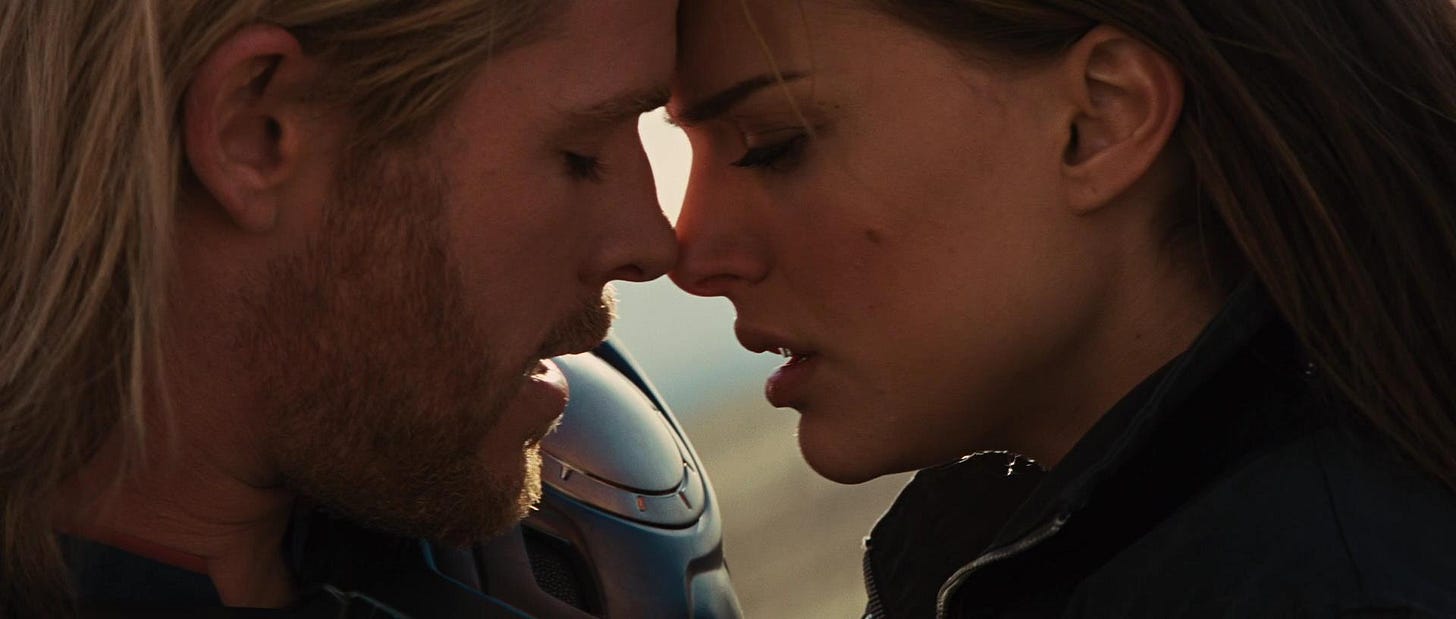The Appealingly Modest Thunder God
The first Thor movie holds up.
Kenneth Branagh’s Thor, from 2011, is generally nestled near the bottom of the MCU rankings. But rewatching now, it feels charmingly self-contained and coherent compared to many of its increasingly bloated successors.
Godlike Battles Down to Earth
In terms of the atmosphere and look of the film, one of the biggest differences between Thor and what followed is the humility in the use of the special effects. In blockbusters like No Way Home and Multiverse of Madness, fully animated monsters occupy the screen for minutes at a time, almost daring you to complain that they look obviously fake.
There’s still a great deal of CGI, in Thor, but Branagh and his animators are cautious with it. Fight choreography is kept down-to-earth—literally, in a very entertaining roll in the mud, which includes some John Woo-inspired slow-mo. When there are more elaborate effects, they take place in shadow or twilight, or are semi-concealed with rapid cuts. The one big full-on daylight battle with a CGI creature features the Destroyer—essentially a big robot, whose smooth armor and stiff movements are relatively easy to render, and whose weapon—a blast of energy—allows the director to jump frequently to practical effects to show the destruction.
The design and milieu aren’t distinctive and immersive like Lord of the Rings or Star Wars. But it feels like someone tried to integrate effects into a movie world rather than the other way around. It’s crafted with some care, not just vomited out onto some green screen.
The Soft Hammer of Hemsworth
The personal touch, and the personality, is evident in the ensemble as well. Tom Hiddleston’s vacillation as Loki between devious mastermind and pouty hurt adolescent has been much praised. But Chris Hemsworth’s Thor is just as good, his bluff bro arrogance so unassuming it charms even as you cheer when he face-plants.
The Marvel quip machine isn’t quite ramped up, and instead Branagh relies on wit and humor that grows out of the plot and characters. Thor as Thunder-God-out-of-water on earth is an absurd premise handled with just the right amount of deflation. After he smashes a coffee cup like a mug of mead and demands more from the barkeep, his human friends ask him not to do that again, and he acquiesces with a solemn oath, delivered with a completely winning smile. There are a series of scenes in which Thor boasts of his martial prowess and is embarrassingly taken down. The funniest is when he is sedated with a needle to the rear, but it’s a joke that doesn’t get old.
Branagh also does well with the movie’s romantic arc. Jane Foster (Natalie Portman) and Thor don’t get a ton of time onscreen together, but they make the most of it. Portman as the geeky scientist gets to do the nervous bumbling that’s usually the male’s part in these stories—fumbling and muttering when she first sees Hemsworth (impressively) shirtless, and almost driving off the road when he grins at her. There are real sparks when they share their one kiss—enough that you can almost believe that they’d both dedicate the rest of their lives to trying to bridge the inter-dimensional space that tragically separates them at the end.
Just a Movie
For all its virtues, I can’t argue that Thor is a great movie. It has many of the problems that plague the MCU still. There are troughs of exposition that swamp the narrative at crucial junctures—the lengthy fantasy novel backstory at the beginning is too tedious to even be funny. The plot manages to be both too busy and too predictable, as the characters shuffle back and forth between worlds to fight fights whose conclusion you already know. The climax, as always, involves the two antagonists beating the tar out of each other in a much too long fight scene that crushes subtlety or nuance to a paste with each shattering blow.
I do appreciate, though, that Thor is focused mostly on telling its own story, treating the foreshadowing of later movies as an extra fun bonus, rather than as the main reason for being. It’s not an accident that the main character spends a good portion of the movie depowered; this is a film that relishes every opportunity it finds to be smaller than super. It’s less an event movie than just a movie. And being willing to be just a movie, in the context of the current MCU, is refreshingly retro.





I was pleasantly surprised by Branagh's THOR given that, the previous time he'd been given a big-budget IP to handle (MARY SHELLEY'S FRANKENSTEIN), he kind of face-planted.
Sir Chuckles (UK film show hosts Kermode and Mayo's affectionate nickname for Branagh) often struggles with big-budget IP movies unless the IP is Willam Shakespeare: JACK RYAN: SHADOW RECRUIT made just enough to break even globally; and while ARTEMIS FOWL's nonexistent box office is clearly thanks to COVID-19, the reviews were uniformly savage. CINDERELLA made bank, and is one of the few Disney live-action "reimaginings" of their animated classics that doesn't make you want to smash your nice expensive UHD TV with a baseball bat, but a significant part of its success is undoubtedly due to The Mighty Mouse Marketing Machine.